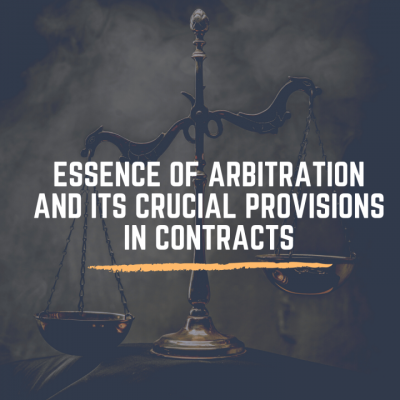
Senior Consultant and Trainer
1. What is Arbitration?
It is a process to resolve dispute outside the courts by impartial and knowledgeable adjudicator and whose decision to the disputed parties may be binding or final.
Generally, Arbitration is an effective and preferable process for settling of disputes among the parties which can avoid lengthy judicial procedures and which takes less time to resolve the issues at an affordable cost and without having negative impact on the project proceedings.
International Recognized Arbitration Institute
“The London Court of International Arbitration (LCIA)” is an institution based in London, United Kingdom providing the services of international arbitration. Actually, it was established in April 1883, prior to the current name, earlier it was renamed twice. The current name was changed in April 1981 to “The London Court of International Arbitration (LCIA)” from “The London Court of Arbitration”. The LCIA is universally recognized as one of the leading arbitral institutions.
Why the Requirement of Arbitration is Crucial in a Contract?
Arbitration is a first threshold for resolution of dispute arises between the parties (mostly Owners and Contractors) having without much disturbances to them or damage to the project. In case, no or inadequate provision of Arbitration is included in a contract, then the parties have to undergo a great deal of trouble to settle their differences of any magnitude or nature, therefore, it is crucial to include sufficient provisions of Arbitration in contracts.
Provisions of Arbitration in Reputed Contracts
As Arbitration is an amicable and mutual cooperative way for resolving the disputes arising between the Owners and Contractors, thus, the provisions of Arbitration in various reputed contracts are as follow:
1. In Saudi New Government Tenders and Procurement Law (New GTPL) and its Implementing Regulation (the Regulation):
In accordance to Article No.: 92 of New GTPL and Article 154 of its Regulation, the provisions are as follow:
· Provision of Arbitration is to be included in the contracts whose estimated value is exceeding SAR 100,000,000 (Saudi Arabian Riyal One Hundred Million) and the Minister of Finance may amend this limit of value.
· Arbitration is permissible with international authorities for the contracts which are concluded with aliens. For further details, please refer to the above stipulated articles.
2. In Federation Internationale des Ingenieurs-Conseils/FIDIC (International Federation of Consulting Engineers – FIDIC Conditions of Contract for Construction – Red Book, Second Edition 2017):
As per the FIDIC Conditions (Clause 21.6 – “Arbitration”), firstly dispute should be amicably resolved by Dispute Board (DB), its members shall be one (1) or three (3), it depend on magnitude and nature of the work. The DB members shall be jointly appointed by the parties (the Owner and the Contractor). The Arbitration provisions shall be included in Particular Conditions (Special Conditions) of the Contract and its proceeding shall perform in the following manner:
· The Arbitration proceedings shall be conducted as per the established Conditions of the Contract Documents.
· If no Arbitration provisions are mentioned in the Contract Documents and if necessary, the dispute shall be settled by Institutional Arbitration Rules of the International Chamber of Commerce, Paris, France.
· Arbitration shall be conducted in official language of the country and the Contract Documents.
· The Arbitrators shall reserve the right to review and revise the determinations, instructions and valuations of the Engineer (Consultant) and the decision of the DB.
3. In ICE Conditions of Contract, Commercial Manual by Brian Meopham, Published by Waterlow Publishers Limited, Clause 66 (1) – “Settlement of Disputes – Arbitration”, states that:
· If any dispute or difference shall arise between the Employer and the Contractor, it shall be referred to and settled by the Engineer and he shall notify his decision to them. The Engineer’s decision shall be final and binding to both parties.
· During the course of dispute the Contractor shall continue the Works with all due diligence.
· If the Engineer fails to give any decision within three (3) calendar months or if either the Employer or the Contractor is dissatisfied with the decision of the Engineer, then they reserves right to initiate Arbitration process as stipulated in the Contract Documents.
4. The Joint Contracts Tribunal (JCT) Standard Building Contract 2011:
In the opinion of the UK reputed JCT, every construction contract must have an adjudication clause, but the parties are free to choose whether the ultimate procedure is to be arbitration or legal proceedings and it sets the following systems for dispute resolution:
· Adjudication, which was introduced by the Construction Act 1996 of UK is a binding but not necessarily final decision.
· Arbitration under the Arbitration Act 1996, which is both final and binding and litigation or legal proceedings, which is also final and binding but may be subject to appeals.
· The Standard Building Contract also refers to mediation, but it does not set out any procedure. Adjudicators and arbitrators can be chosen by the parties or by the appropriate nominating or appointing body, respectively.
How can Arbitration be avoided?
Arbitration can be meritoriously avoided, if the following conditions are included in Contracts and efficiently implemented:
· If the Contract Documents are clearly and comprehensively prepared as per the provisions of Article No.: 5 and 22 of the New GTPL i. e. complete, free from errors, omissions and ambiguities.
· The implementation of contractual conditions must be in orderly manner i. e. there should not be any lapses.
· All the contractual obligations and rights are efficiently carried-out by both parties (Owner and Contractor).
· All the provisions of Arbitration including authorities of the Arbitrator in the Contract Documents are to be clearly and sufficiently stipulated.
· A provision in the Contract Documents has to be incorporated that a licensed Arbitrator shall only be engaged, if needed.
· Provision of Daywork is to be included in the Contact Documents. Daywork means by which a contractor is paid for any additional work, other than the original Scope of Work of the Contract and for which the contractor shall be compensated as per the basis of cost of labor, materials, etc. which was submitted by the contractor in his Bid.
· Percentage of Variation Order (positive or negative) must be clearly stipulated in the Contact Documents.
· The provision of correction of errors and inclusion of omissions in the Contract Documents at any time after their identification shall be honored. Also, the affected party shall be compensated for the damages incurred due to those errors or omissions.
***** End of Article *****





